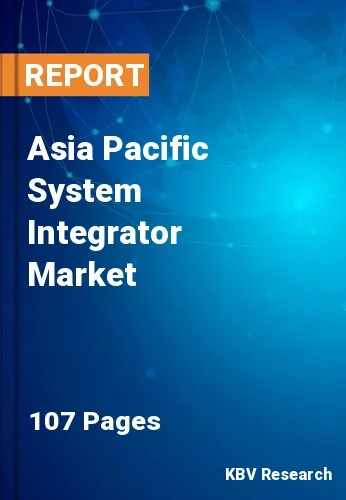The Asia Pacific System Integrator Market would witness market growth of 6.0% CAGR during the forecast period (2022-2028).
Investing in technology solutions, deploying intelligent edge arrays, utilizing data and artificial intelligence (AI), infrastructure modernization, revamping internal and client-facing applications, workplace modernization to endorse remote work, and network and security design and management are just a few of the many facets of your technology strategy that a well-equipped solutions integrator can handle.
The complexity of the computer infrastructure is rising. System integrators are crucial since they regularly verify the system's compatibility and look for potential problems and defects, while system administrators ensure that an organization's network system and computers are current and in line with the most recent technological advancements.
To guarantee that everything is tracked and fully covered, the plan, strategy, and testing scenario definitions can be made. The documents and information that a system integrator collects are related to the integration standards. Create documentation for the system's installation, testing, and administration. After completing the system integration test, model validation, and performance test, you should also give documentation. In the long run, this enables improved tracking and handover.
As a result of government programs encouraging the modernization of the country's manufacturing sector, China is the world's largest market for industrial robots. Examples of policy initiatives include the National High-Tech R&D Program, the Robotic Industry Development Program, and Made in China 2025, which promoted increasing investments in automation and robotics. China is making significant investments in high technology in an effort to lead the manufacturing world.
The China market dominated the Asia Pacific System Integrator Market by Country in 2021, and would continue to be a dominant market till 2028; thereby, achieving a market value of $3,022.5 million by 2028. The Japan market is estimated to grow a CAGR of 5.3% during (2022 - 2028). Additionally, The India market would experience a CAGR of 6.6% during (2022 - 2028).
Based on Technology, the market is segmented into Industrial Internet of Things (IIoT), Manufacturing Execution System (MES), Programmable Logic Controller (PLC), Supervisory Control and Data Acquisition (SCADA), Machine Vision & Machine Condition Monitoring, Human-Machine Interface (HMI), Distribute Control System (DCS), Functional Safety System, Plant Asset Management, Industrial PC and Industrial Robotics. Based on Service Type, the market is segmented into Hardware Integration Service, Software Integration Service and Consulting Service. Based on Industry, the market is segmented into Oil & Gas, Mining & Metal, Chemical & Petrochemical, Electrical & Electronics, Food & Beverage, Pharmaceutical, Automotive, Aerospace & Defense and Others. Based on countries, the market is segmented into China, Japan, India, South Korea, Singapore, Malaysia, and Rest of Asia Pacific.
Free Valuable Insights: The Worldwide System Integrator Market is Projected to reach USD 37 Billion by 2028, at a CAGR of 5.4%
The market research report covers the analysis of key stake holders of the market. Key companies profiled in the report include ATS Automation Tooling Systems, Inc., Barry-Wehmiller Group, Inc., John Wood Group PLC, Avanceon limited, JR Automation (Hitachi, Ltd.), Tesco Controls, Inc. (United Flow Technologies), Burrow Global, LLC, Prime Controls, LP, Rockwell Automation, Inc. (MAVERICK Technologies, LLC), and INTECH Process Automation Inc.
By Technology
By Service Type
By Industry
By Country
Our team of dedicated experts can provide you with attractive expansion opportunities for your business.

